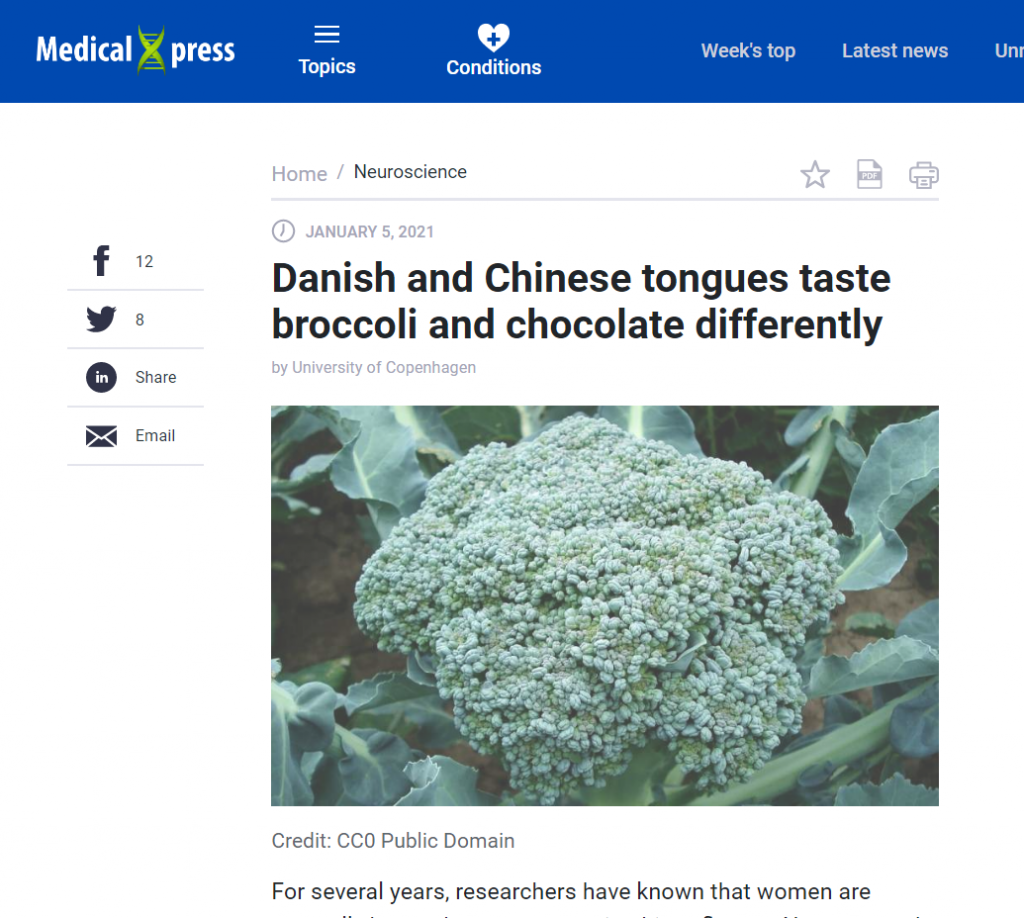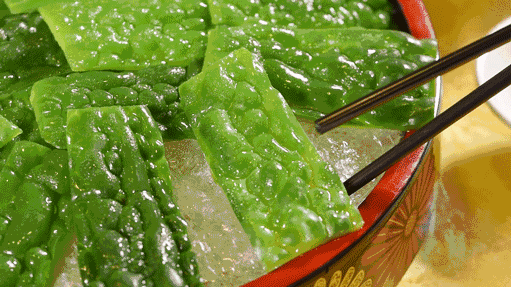
Sour, sweet, bitter, spicy, salty… If you sort by preference, bitterness might be ranked last.

Although some people like bitter gourd and Hei Qiao very much, the bitterness still makes most people avoid them.
A new study recently showed that Chinese people are more sensitive to bitterness, and relatively less fond of “bitterness.”

Recently, two studies conducted by food scientists and computer scientists at the University of Copenhagen, Denmark, published an article on the Medical Xpress website, found that Danes are not as good as Chinese in distinguishing bitterness, and most Chinese are more sensitive to bitterness.
Relatively speaking, the Danes are more able to “endure hardship.” This phenomenon is related to the anatomical difference between the tongue surface of Danes and Chinese.
The researchers analyzed the number of “fungus” tongue papillae on the tongues of 152 test subjects, 75 of whom were Danes and 77 were Chinese. Participants were between 18 and 55 years old and were all healthy non-smokers, of whom 71% were women.
The “fungus” tongue papilla is located at the tip of the tongue. It contains most of the taste buds and plays a central role in food and taste experience. To understand the meaning of tongue papillae in food preferences of different cultures and races, we need to know more about their distribution, size and quantity. The subjects’ sensitivity to bitterness was tested by tasting the bitter substance propylthiouracil, which is considered a genetic marker for differences in taste.
The analysis showed that Chinese subjects generally had more tongue papillae than Danish subjects, which explains why Chinese people are more sensitive to bitterness.
In addition, Danes and Chinese have different preferences for food texture. 77% of Chinese people are of the “smooth sucking type” and prefer soft-textured foods, squeezing the food with their tongue and palate. 73% of the Danes are “satisfying and chewing” and prefer to chew food. In Denmark, foods such as rye bread and raw carrots are more popular.
Don’t like hardship is related to the tongue and brain
Bitterness is not a good taste, but some people are very tolerant of it. From a psychological explanation, taste preference is the external manifestation of a person’s internal state.
Psychologist Jane Nash believes that preference for taste is related to a person’s personality. There are many words that use “taste” to describe a person’s characteristics, such as hot, bland, and sweet… This is not a coincidence. The things you love to eat can indeed correspond to your own personality.

The sensitivity to bitterness is different for everyone. Some people can accept very bitter foods, while others can’t eat bitterness at all. The gene that can distinguish bitterness is called TAS2R38, and the dominant recessive state of this gene determines our sensitivity to bitterness. Most people are afraid of hardship, precisely because the body has evolved bitter receptors.
In addition, our whole body, including from the tongue to the brain, has receptors for feeling bitter taste. Although the significance of their existence is mostly unclear, many studies have shown that the sensitivity and acceptance of bitter taste is good for our health.
Properly eating bitterness is good for health
Some natural ingredients in food that are bitter to eat are good for health, and everyone should eat them often.
1. Naringin: Prevent thrombosis
Citrus fruits such as lemons and grapefruit often contain flavonoids such as naringin in their skins, so they have a slight bitter taste. Studies have found that naringin has anti-inflammatory and antioxidant activities, which is beneficial to reduce blood viscosity and prevent thrombosis.
For example, after eating the pulp, you might as well learn to use pomelo peel. Cut the green and yellow grapefruit peel into silk, and cut the soft white sponge in the middle into slices, and make grapefruit tea with honey, which has the functions of digestion, expectoration and hangover.
It can also be paired with meat to make pomelo peel pork, pomelo-flavored steamed pork, pomelo-flavored steamed pork ribs, etc. The aroma of pomelo and meat penetrate each other, creating a unique flavor.
2. Quinine: Relieve heat and relieve fever
The bitter taste of bitter gourd mainly comes from quinine (also known as cinchona frost). As an alkaloid, it is a good medicine for people to fight against malaria. Studies have found that it also has the effect of relieving heat and reducing fever.

On the whole, bitter gourd is rich in vitamin C and potassium, and it is the best among vegetables. Bitter gourd also contains chromium and insulin-like substances, which is an ideal diet choice for diabetic patients.
It is best to choose bitter melon with larger tumors and fullness, which not only has thicker flesh, but also has higher nutritional value.
3. Caffeine: a clear mind
The bitterness in tea and coffee mainly comes from caffeine, which can accelerate the body’s metabolism and keep people awake.
Drinking tea has a positive effect on the human body, and moderate tea drinking can reduce the risk of type 2 diabetes, stroke, cardiovascular disease, ovarian cancer and gastric cancer.
Drinking 1 to 2 cups of coffee a day can reduce the total risk of death, and the total mortality of 2 to 4 cups can be significantly reduced. At the same time, it can reduce the risk of diabetes, coronary heart disease and stroke.
When drinking coffee, try to avoid adding sugar and coffee mate, so as not to increase the intake of calories and trans fatty acids. Pregnant women should reduce coffee intake, and those with high blood pressure should pay attention to the time of drinking coffee, try not to drink coffee early in the morning to avoid rapid blood pressure rise.
4 kinds of “bitterness” can be dangerous
Although bitter foods such as coffee and black chocolate are irresistible, some bitterness may be “dangerous food.”
Bitter melon
The melons and vegetables I usually eat, such as zucchini, gourd, cucumber and pumpkin, etc., if they are obviously bitter, it may be that the melons and vegetables are grafted with other plants, or the plants “self-protect” in a high temperature environment and form a large amount of bitter cucurbitacin. The alkaline glycoside biotoxin in it also belongs to cucurbitacin), which may cause food poisoning or even shock after eating.
After cooking and heating this kind of food, the toxicity of biotoxins will not weaken. After buying melons and vegetables, peel them and remove the flesh, you can lick them with your tongue first. Don’t eat the bitter ones.
What needs to be reminded is that the bitter gourd contained in bitter gourd is also more dangerous. It is recommended not to eat it every day or all at once.
Stale citrus
Grapefruit and oranges belong to the citrus genus, and their own bitterness is due to the special limonin, which is not harmful to the human body when eaten.

Some oranges may not be visible on the outside, but they taste a bit bad and even bitter. This is because oranges stored at low temperature for a long time, due to their protoplasm dehydration, protein and colloid coagulation, reduce the resistance to microorganisms, mold and other spoilage bacteria are easy to invade the fruit body to grow and reproduce, making oranges bitter.
If part of the orange is moldy, do not eat the rest, because the toxins produced by the mold can spread to other parts of the fruit, posing a health threat.
Sweet potato with hard potato heart
Under the action of some molds, the sweet potato will be infected with black spot, brown or black spots appear on the epidermis, which cannot be completely removed even after heating. The heart of the potato will become hard and bitter. People may experience nausea, vomiting, abdominal pain and other symptoms within hours to days after eating.
Therefore, eating raw or cooked sweet potatoes with dark spots may cause poisoning. It is recommended that sweet potatoes with broken skins should not be stored for too long, and should be checked frequently to pick out sweet potatoes with brown or black spots in time.
Fresh almonds
Bitter fresh almonds contain “amygdalin”, which will produce toxic hydrocyanic acid and benzaldehyde after being hydrolyzed. If you eat too much, it will be poisoned and even fatal.
Although traditional Chinese medicine will use bitter almonds in combination with other traditional Chinese medicines to treat colds, coughs, asthma, chronic bronchitis and other diseases, they must be consumed under the guidance of a doctor.
However, after bitter almonds are processed, most of the amygdalin has been removed, so there is no need to worry about poisoning.
Comments